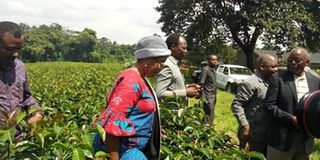Research is key towards production and quality improvement of coffee in Tanzania

What you need to know:
Tanzania Coffee Research Institute (TaCRI) is a coffee stakeholders-owned institute obligated to contribute to the coffee subsector in the country by putting emphasis on coffee stakeholders’ mission that states, “Research is a bedrock of coffee growers.”
Tanzania Coffee Research Institute (TaCRI) is a coffee stakeholders-owned institute obligated to contribute to the coffee subsector in the country by putting emphasis on coffee stakeholders’ mission that states, “Research is a bedrock of coffee growers.”
TaCRI Chief Executive Officer, Deusdedit Kilambo says, TaCRI’s goal is anchored on having an embryonic and sustainable coffee subsector in the country and ensures an access to and supply of effective coffee growing technologies for;
• Value addition,
• Improving quality,
• Reducing production cost,
• Improving Tanzania coffee competitiveness in the world market,
• Increasing income and livelihoods to the coffee growers and
• Bolstering coffee contribution to the country’s GDP.
Dr, Kilambo says in an effort to accomplish set of goals, TaCRI implement the following strategies:
Strategies to revive coffee subsector in Tanzania
Strategies laid down for giving the coffee subsector kiss of life in the country are categorized into three parts
Short-term strategy
• Maintaining old coffee seed-lings by considering eight (8) commandments of productivity improvement.
• Maintenance of old coffee seedlings harmonize with general farm maintenance and best coffee farm-ing methods compliance.
Permanent strategy
Improving coffee quality by conforming to ten (10) preconditions of quality improvement and particularly twisting-farmers’ arm into coffee piercing at village or household level.
Long-term strategy
The focus here is to change all of the seedlings that are badly affected by the diseases of coffee wilt disease (CWD), coffee berry disease (CBD), coffee leaf rust and plant quality and resilient coffee seedlings’ species of Arabika and Robusta instead.
TaCRI’s move towards implementation of strategies of coffee crop
“TaCRI has been working by observing five (5) years strategic action plans (SAPs). The strategies have been set by number of consultants through a participatory approach and particularly engage coffee stakeholders across various lev-els,” said Dr Kilambo.
“As of now, we have already implemented three strategies; 2003-2007/8; 2008/9-2012/13 and 2013/14 - 2017/18 and we are on to the next one (fourth strategy 2018/19-2022/23. Both strategies focus on addressing prevalent coffee challenges and we take huge pride on our success against coffee stakeholders’ set-backs in the country,” said Dr, Kilambo.
Research programs for coffee growth
Dr Kilambo expounds, “We have four up and running research programs specifically for addressing challenges face coffee subsector as follows:
Coffee improvement programme
The program is designed for conducting coffee improvement researches. Through this program, TaCRI has allocated 19 quality species of coffee seedlings which are resilient to coffee berry disease (CBD) for Arabika and coffee leaf rust, coffee wilt disease (CWD) for Robusta.
Both species are rich in atypical flavor or taste as old coffee or much more, boost productivity (more than old coffee) and significantly reduce production cost of 30 to 50 percent, which in other words, it improves farmer’s income and livelihoods.
The introduction of these new species translates into remarkable achievements and surely are dynamics of green revolution. Other than that, they are believed to be the major drivers of an increase in production, quality improvement, and income and livelihoods improvement.
Also, TaCRI has researched and recommended pertinent technologies for quality seedlings hybrids’ manufacture which are of diverse applications;
(1) Clonal propagation
(2) Grafting
(3) F1 hybrid seeds and
(4) Tissue culture or somatic embryogenesis.
Coffee productivity and quality improvement programme
Through this program, TaCRI has already outlined viable coffee productivity and quality improvement technologies. Both productivity of plant and farm are crucial to improving farmer’s income and livelihoods. We already have these technologies such as eight (8) preconditions of which include proper use of fertilizers and pesticides and a number of farmers have just adopted these technologies with many farms having gone through the maintenance which in turn bolstered productivity. Quality of coffee is significant towards attaining reason-able price in the world market.
Compliance with quality improvement technologies such as eight (8) preconditions, can dramatically avail farmers on quality coffee produce and reasonable prices in the world market. Our state-of-art lab found within the program, has always played vital role on soil and plant analysis and offer desirable advice towards coffee productivity improvement.
Technology transfer, advocacy and training
Now through this program, we have put in place a strategy that aimed at enabling farmers and other stakeholders through participatory village-based training and put much emphasis on training of trainers. This participatory approach through village-based groups, have proven success in the transfer of technology. Furthermore, the institute has improvised an approach of using farmers’ promoters to transfer the technology. Situated on this approach, a farmer after being trained by experts, carries monumental responsibility of passing that knowledge down to his/her colleagues.
The approach has shown positive results coupled with an increased demands of technologies to areas where farmers and extension officers operate. We have launched TaCRI zonal sub-stations with the view of enabling majority of stakeholders’ access to research services immediately.
TaCRI runs number of research substations in coffee-growing regions such as: Lyamungu, Moshi; Ugano Mbinga Ruvuma; Mbimba Mbozi Songwe; Maruku Bukoba Kagera; Mwayaya Buhigwe Kigoma naSirari Tarime Mara. Most substations have brought the transfer of technologies into fruition.
Livelihoods and income security
The program entails divergent systems analysis and livelihoods based on coffee growing regions. Also, prioritization of major bottlenecks of productivity and profitability in line with recommending solutions.
Achievement after coffee subsector’s revival
Dr Kilambo says, “TaCRI has continued with its strategy to outline technologies in boosting productivity and quality of our coffee as well as reducing production cost in an effort to improve farmers’ income and livelihoods and we are proudly of the following accomplishments.”
The institute has carried on researching the highly productive coffee species, resilience to disease and desirable quality in local and foreign market. 38 species of Arabika are examined, of which six (6) species are proven extraordinary in resisting disease. Unfolding other bene-fits garnered from the examination, the species produce over two (2) tons per hectare and interesting story--would be its unmatched taste preferred in local and foreign market.
The hybrid seed production research is complete, with a target of producing two (2) tons (equivalent to 8 million seedlings) since 2019/20. If this works would probably facilitate quality seed-ling production; one kilogram produces up to 4,000 seedlings if are planted and handled properly.
TaCRI has packed and distributed 185,707 leaflets on better coffee farming practices. Leaflets about new challenges such as techniques on how to overcome climate change, pests are all prepared by the Institute. TaCRI has issued new books; Better farming techniques of Arabika (upgraded version), better farming techniques of Robusta (new version) and better farming practice training curriculum in Swahili and English languages. These books and curriculum will help a lot the training of extension officers and farmers.
“TaCRI has continued to implement 2015 general election CCM Manifesto which among other directives; cap 22, (d) states that, CCM requires government to enhance research system for discovering and evaluating quality breeds of crops with capacity to produce high yields that are resilient to climate change,” Dr Kilambo explained.
He reiterates, TaCRI has achieved a great deal of this drive by producing quality breeds of coffee that are resilient to number of disease, high productivity and desirable quality in the local and foreign market. We are grateful for a directive from the Minister of Agriculture, Japhet Hasunga (MP), also his deputies Omari Mgumba (MP) and Hussein Bashe (MP). The list goes on, the Permanent Secretary and Deputy Permanent Secretary and all of ministry’s directors. We also give credits to Tanzania Coffee Board (TCB) for its unwavering cooperation.


